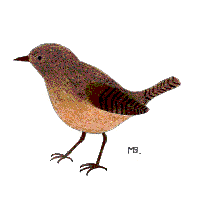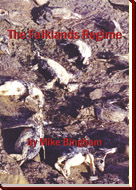 |
 |
| |
|
|
Cobb's Wren Local Name: Rock Wren Breeding Range: Falkland Islands
The Cobb's Wren is unique to the Falkland Islands, but has disappeared from most of the inhabited islands due to the accidental introduction of rats, which eat the eggs and young. Unlike the Grass Wren, the Cobb's Wren prefers boulder or rocky beaches, nesting in crevices or amongst tussac grass stems. Here it is safe from the avian predators with which it evolved, but not from introduced rats. The nest is a hollow ball of grass with an entrance hole, lined with feathers. Three to four eggs are laid from October to December. Adults mainly feed on invertebrates taken from under stones and amongst rotting seaweed, but they also feed on terrestrial insects and grass seeds. It is vital that the few remaining rat-free islands are protected against infestation if the Cobb's Wren is to survive. Sexes are similar in appearance. |
|
|
||||||||||||||||||||||||||||




